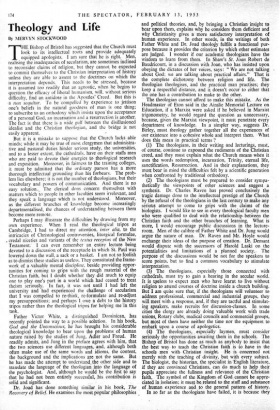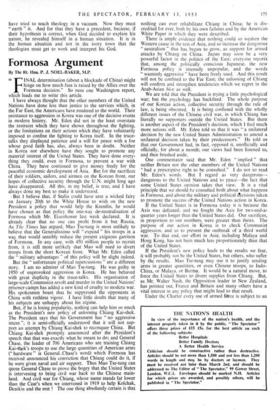Theology and Life
By MERVYN STOCKWOOD THE Bishop of Bristol has suggested that the Church must look to its intellectual roots and provide adequately equipped apologists. I am sure that he is right. Men, realising the inadequacies of secularism, are sometimes inclined to reconsider claims of religion, but they cannot be expected to commit themselves to the Christian interpretation of history unless they are able to assent to the doctrines on which the interpretation depends. This needs to be stressed, because it is assumed too readily that an agnostic, when he begins to question the efficacy of liberal humanism, will, without serious difficulty, find an antidote in the Apostles' Creed. But this is -a non sequitur. To be compelled by experience to jettison one's beliefs in the natural goodness of man is one thing; to subs.cribe to an orthodoxy which insists upon'the acceptance of a personal God, an incarnation and a resurrection is another. The fact is that there is a wide gulf between the disillusioned idealist and the Christian theologian, and the bridge is not easily apparent. - But it is a mistake to suppose that the Church lacks able minds; while it may be true of most clergymen that administra- tive and pastoral duties hinder serious study, the universities, and to a lesser extent, the cathedrals, have on their staffs men who are paid to devote their energies to theological research and exposition. Moreover, in fairness to the training colleges, it must be admitted that the ordinary parson has a more thorough intellectual grounding than his forbears. The prob- lem lies elsewhere; it is not the number of theologians, but their vocabulary and powers of communication. And there is no easy solution., The clerical dons concern themselves with matters which to people in other faculties seem irrelevant, and they speak a language which is not understood. Moreover, as the different branches of knowledge become increasingly departmentalised, the chances of understanding between them become more remote.
Perhaps I may illustrate the difficulties by drawing from my own experience. When I read the theological tripos at Cambridge, I had to direct my attention, inter alia, to the intricacies of Christological controversies, liturgical formulae, . credal niceties and variants of the textus receptus of the New Testament: I can even remember an entire lecture being devoted to a discussion of the receptacle in which St. Paul was lowered down the wall, a sack or a basket. I am not so foolish as to dismiss these studies as useless. They constituted the frame- work of a-valuable mental discipline, beside providing oppor- tunities for coming to grips with the rough material of the Christian faith, but I doubt whether they did much to equip one to play one's part in a world which had ceased to treat theism seriously. In fact, it was not until I bad left the university and had experienced the challenge of secularism that I was compelled to re-think, re-formulate and re-adjust my presuppositions; and perhaps I owe a debt to the history tripos rather than the theological tripos for helping me 'in this task.
Father Victor White, a distinguished Dominican, has recently pointed the way to a possible solution. In his book, God and the Unconscious, he has brought his considerable theological knowledge to bear upon the problems of human nature raised by the studies of Jung, Adler and Freud. He readily admits, and Jung in the preface agrees with him, that the two sciences use different languages, and, although both often make use of the same words and idioms, the content, the background and the implications are not the same. But he has made the attempt to understand, the other side and to translate the language of the theologian into the language of the psychologist. And, although he would be the first to say that he bad not been entirely successful, his contribution .is solid and significant.
Dr. Joad has done something similar in his book, The Recovery of Belief. He examines the most popular philosophies and political theories, and, by bringing a Christian insight to bear upon them, explains why he considers them deficient and why Christianity gives a more satisfactory interpretation of human experience. In other words, in the writings of both Father White and Dr. Joad theology fulfils a functional pur- pose because it provides the criterion by which other estimates are judged. I wonder if our academic theologians have the wisdom to learn from them. In Shaw's St. Joan Robert de Baudricourt, in a discussion with Joan, who has insisted upon obeying the dictates of her voices, says: " We are not talking about God; we are talking about practical affairs." That is the complete dichotomy between religion and life. The theologian theologises, and the practical man practises; they keep a respectful distance, and it doesn't occur to either that the one has a contribution to make to the other.
The theologian cannot afford to make this mistake. As the Headmaster of Eton said in the Ainslie Memorial Lecture on Education, if a Marxist were asked if he believed in Marxist trigonometry, he would regard the question as unnecessary, because, given the Marxist viewpoint, it must penetrate every department of knowledge. In a simpler way, suggests Dr. Birley, must theology gather together all the experiences of our existence into a cohesive whole and interpret them. What does this mean in practical terms ?
(1) The theologians, in their writing and lecturings, must, of course, continue _to expound the rudiments of the Christian creed, and they must explain what the Church means when it uses the words redemption, incarnation, Trinity, eternal life, sanctification, Resurrection.- And in their explanations, they must bear in mind the difficulties felt by a scientific generation when confronted by traditional orthodoxy.
(2) The theologians must be prepared to consider sympa- thetically the viewpoints of other sciences and suggest a synthesis. Dr. Charles Raven has proved conclusively the tragic damage done to the intellectual prestige of the Church by the refusal of the theologians in the last century to make any serious attempt to come to grips with the claims of the biologists. I would like to see in every theological faculty men who were qualified to deal with the relationship- betWeen the Christian faith and the other branches of learning. What is more, I would encourage public discussions in the lecture- room. Men of the calibre of Father White and Dr. Jung would argue the nature of man. Dr. Raven and Mr. Hoyle would exchange their ideas of the purpose of creation. Dr. Demant would dispute with the successors of Harold Laski on the potentialities and limitations of a planned society.- The purpose of the discussions would be not for the speakers to score points, but to find a common vocabulary to stimulate interpretation.
(3) The theologians, especially those connected with cathedrals, must try to gain a hearing in the secular world. It is useless to expect men who have learnt to live without religion to attend courses of doctrine inside a church building. But I am quite sure that, if the theologians will volunteer to address professional, commercial and industrial groups, they will meet with a response, and, if they are tactful and stimulat- ing speakers, make recruits for discussion-classes. In some cities the clergy are already doing valuable work with trade unions, Rotary clubs, medical councils and commercial groups, but most of them have neither the time nor the equipment to embark upon a course of apologetics.
(4) The theologians,; especially laymen, must consider seriously the opportunities awaiting them in the schools. The Bishop of Bristol has done as much as anybody to insist that the best way to teach the Christian faith is to have in the schools men with. Christian insight. He is concerned not merely with the teaching of divinity, but with every subject. The biologist, the historian, the specialist in 'English literature, if they are convinced Christians, can do much to help their pupils appreciate the fullness and relevance of the Christian faith. The symbol of the Kingdom of God cannot be appre- ciated in isolation; it must be related to the stuff and substance of human experience and to the general pattern of history.
In so far as the theologians have failed, it is because they have tried to teach theology in a vacuum. Now they must " earth " it. And for that they have a precedent, because, if their hypothesis is correct, when God decided to explain his nature, he revealed himself in a human situation. It is in the human situation and not in the ivory town that the theologian must get to work and interpret his God.



































 Previous page
Previous page